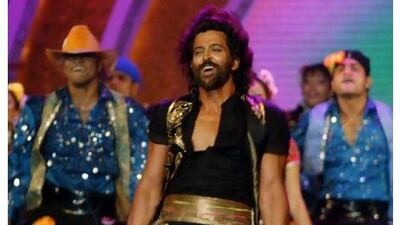Just as television is no longer a dirty word in the American show business industry, the small screen is proving an increasingly attractive way for Bollywood actors to broaden their careers.
The trend is towards hosting or appearing on reality programming, which makes sense for stars who want to increase their exposure by using a medium that is much more accessible than film, according to the film producer Inderjit Singh Daheley, whose projects include Namhe Sapne and Badalte Chehre.
"Even people who do not have a roof over their head still have access to a TV," he says.
After Amitabh Bachchan started the trend in 2005 with the relaunched Kaun Banega Crorepati?, the UK-based show modelled on Who Wants to Be a Millionaire?, other Bollywood actors followed suit, including Salman Khan in Big Boss and Shah Rukh Khan in the Indian version of Are You Smarter than a 5th Grader?.
"Salman Khan did Big Boss in India; after that he did three films and all of them grossed more than Rs200 million [Dh14.7m]," says the director and TV producer Karan Saluja, who has launched several television channels including ARY Digital-Urdu and Gujari-Gujrati. He is in the process of launching a channel in the UAE.
After joining the StarPlus programme Just Dance, which premiered in June, Hrithik Roshan's film Zindagi Na Milengi Dubara went on to become a huge box office hit.
And it's not just the domestic fans these stars are courting, says Saluja. These films are dubbed into a variety of languages, including Spanish and German, and distributed around the world. "Due to the TV show being shown worldwide, people outside India who didn't know Hrithik Roshan, now know who he is."
However, Daheley argues that there are drawbacks to too much exposure: "I think you lose interest seeing the same face every day. Hrithik, for example, has come too much on TV and if his film comes out, I'll go and see it but I wouldn't be excited."
There are also drawbacks on the production side, as the higher-profile celebrities begin to demand better financial rewards from filmmakers.
"They sometimes get carried away with the money they've made on television," says Saluja. "They may think, OK if I can work for 20 days and make US$5 million [Dh18.4m] on TV, why shouldn't I get $10m working on a film for 40 days? That's sometimes a disadvantage of a film star being popular on TV, and then coming back to the film industry and asking a bigger price, which is not justified."
However, the inflationary effect works in the other direction, too, he says, explaining that the television actors benefit financially as the influx of Bollywood names pushes up the going rate.
The success of the Indian television industry lies in the depths that can be plumbed from reality talent shows, such as Sa Re Ga Ma and Indian Idol, where Bollywood actors and other celebrities are often included in the judging panels.
"India is a country that has a population of 1.2 billion people and one programme is not enough to explore the talent of what India has," insists Saluja.
There is also a spin-off effect from the contestants who rise to the top of each show, he explains.
"As a talent, when you perform on a particular platform and you are noticed by a million people, then in your own society, village, city or state you will get contracts to perform with managers and other events, which becomes your livelihood. So these shows make the poorer richer, it helps them not only fame wise but monetarily also."
The British Asian music producer Niraj Chag believes that having Bollywood celebrities included in the judging panel can work well.
"As long as the judges are experienced and accomplished in the fields that they are judging, then I think it's a great platform for new talent," he says. "Though having said that, many of these shows are manipulated in order to make entertaining television, so I would take some of the 'narratives' they manufacture with a pinch of salt."

